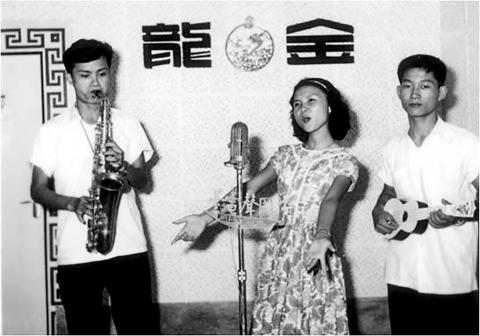While history is mostly presented through text and images, is it impossible for audio, as ephemeral as it is, to be a part of history? It was this question that drove the Changhua County Government’s Bureau of Cultural Affairs to launch its “sounds of history” digitization project.
“There is usually less emphasis on history preserved in sound, but it is an element that could complement our understanding of history from text and imagery,” bureau Director Chen Wen-pin (陳文斌) said.
Using radio stations as an example, Chen said the voice and tone of radio hosts offer a glimpse into the unique atmosphere of an era, while the advertisements shed light on the social and economic conditions.

Photo courtesy of the Changhua County Cultural Affairs Bureau
One of the great sources of preserved audio is the Radio Taiwan International (RTI) branch in the county’s Lugang Township (鹿港), he said.
While the branch is now shuttered, its location on the coastline and relative proximity to China made it an ideal place from which to broadcast psychological warfare programs and gather intelligence following its establishment in 1966, Chen said.
The station holds the world’s only extant recording of former Chinese leader Mao Zedong’s (毛澤東) speech after he swam across the Yangtze River on July 16, 1966, in which he urged young people to “train themselves in the rivers and sea,” he said.

Photo courtesy of the Changhua County Cultural Affairs Bureau
China has even contacted Taiwan to purchase the recording, Chen added.
Orders for Taiwanese intelligence agents operating in China were also broadcast from the station, often as numerical codes, he said.
As such, the station was deemed a military compound and assigned a military garrison, Chen said.
“Hopefully the building that housed the station could be converted into a museum about the Cold War, playing the sounds and voices recorded as the station was broadcasting to the region,” he added.
Another source of preserved audio is the 65-year-old Kuo Sheng Broadcasting Station in Changhua City, Chen said.
The station’s archives hold tens of thousands of vinyl records and tape reels, many of which contain interviews with celebrities and advertisements, he said, adding that the center is a veritable treasure trove for archived audio material.
Changhua County, home to many troupes that have existed for more than a century, is an established center for Beiguan and Nanguan music, and the recordings of the troupes should be digitized and preserved for future generations, he said.
Recordings of interviews with White Terror era victims should also be preserved, Chen said.
As Hoklo (also known as Taiwanese) is the primary language spoken around the county, the unique dialects in different areas should also be preserved, he said.
The ease of travel has led to the withering or outright disappearance of some local dialects, such as the Lugang dialect and the dialect in the Yongjing Township (永靖) area, he added.
Some dialects only exist in the memories of elderly people, and if they are not recorded soon, they will disappear forever, Chen said.

‘DENIAL DEFENSE’: The US would increase its military presence with uncrewed ships, and submarines, while boosting defense in the Indo-Pacific, a Pete Hegseth memo said The US is reorienting its military strategy to focus primarily on deterring a potential Chinese invasion of Taiwan, a memo signed by US Secretary of Defense Pete Hegseth showed. The memo also called on Taiwan to increase its defense spending. The document, known as the “Interim National Defense Strategic Guidance,” was distributed this month and detailed the national defense plans of US President Donald Trump’s administration, an article in the Washington Post said on Saturday. It outlines how the US can prepare for a potential war with China and defend itself from threats in the “near abroad,” including Greenland and the Panama

A wild live dugong was found in Taiwan for the first time in 88 years, after it was accidentally caught by a fisher’s net on Tuesday in Yilan County’s Fenniaolin (粉鳥林). This is the first sighting of the species in Taiwan since 1937, having already been considered “extinct” in the country and considered as “vulnerable” by the International Union for Conservation of Nature. A fisher surnamed Chen (陳) went to Fenniaolin to collect the fish in his netting, but instead caught a 3m long, 500kg dugong. The fisher released the animal back into the wild, not realizing it was an endangered species at

The High Prosecutors’ Office yesterday withdrew an appeal against the acquittal of a former bank manager 22 years after his death, marking Taiwan’s first instance of prosecutors rendering posthumous justice to a wrongfully convicted defendant. Chu Ching-en (諸慶恩) — formerly a manager at the Taipei branch of BNP Paribas — was in 1999 accused by Weng Mao-chung (翁茂鍾), then-president of Chia Her Industrial Co, of forging a request for a fixed deposit of US$10 million by I-Hwa Industrial Co, a subsidiary of Chia Her, which was used as collateral. Chu was ruled not guilty in the first trial, but was found guilty

The Chinese Nationalist Party (KMT) is maintaining close ties with Beijing, the Democratic Progressive Party (DPP) said yesterday, hours after a new round of Chinese military drills in the Taiwan Strait began. Political parties in a democracy have a responsibility to be loyal to the nation and defend its sovereignty, DPP spokesman Justin Wu (吳崢) told a news conference in Taipei. His comments came hours after Beijing announced via Chinese state media that the Chinese People’s Liberation Army’s Eastern Theater Command was holding large-scale drills simulating a multi-pronged attack on Taiwan. Contrary to the KMT’s claims that it is staunchly anti-communist, KMT Deputy